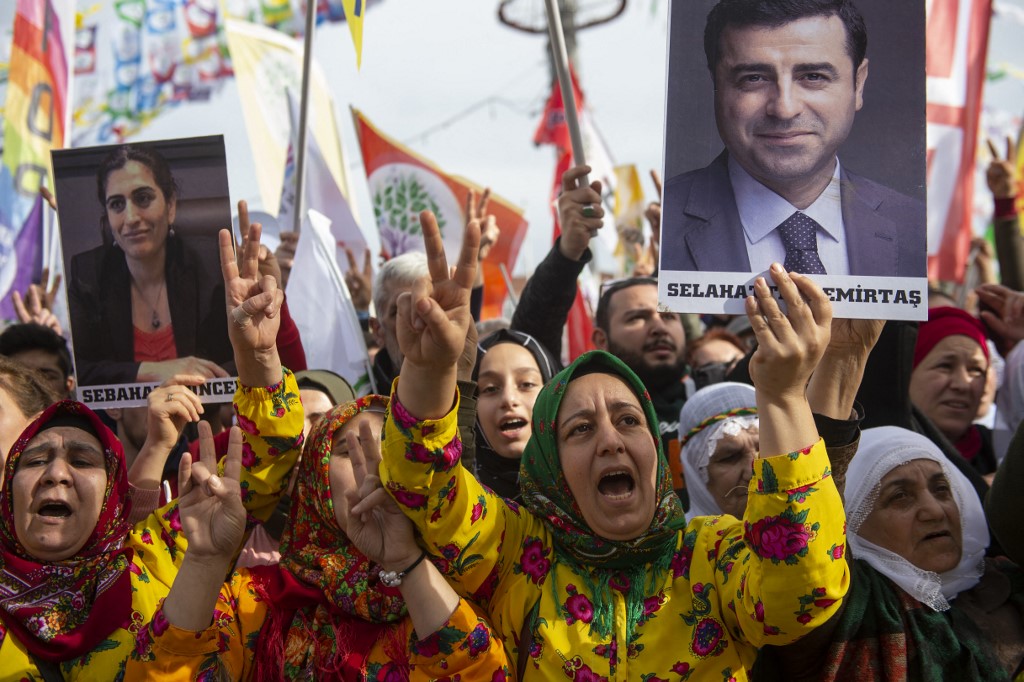An Ankara court’s decision to hand down lengthy sentences to dozens of Kurdish politicians, including imprisoned leaders Selahattin Demirtaş and Figen Yüksekdağ, in the long-running Kobani trial has prompted calls for protests in Turkey’s major cities, while Turkish authorities resort to emergency measures to prevent unrest.
Demirtaş, who was sentenced to 42 years, and Yüksekdağ, who received 30 years, were among the 108 former pro-Kurdish Peoples’ Democratic Party (HDP) politicians on trial for their alleged roles in deadly protests in 2014.
The Ankara 22nd High Criminal Court’s decision came during the 83rd hearing of the trial.
Other sentences included 10 years for Mardin Mayor Ahmet Türk; 13 years, four months for broadcasting watchdog RTÜK member Ali Ürküt; 22 years, six months for former HDP vice chair Alp Altınörs; nine years, nine months for former HDP MP Ayla Akat Ata; and 12 years for former HDP MP Sebahat Tuncel, with Ata and Tuncel released pending appeal. Several individuals, including former HDP deputies Altan Tan, Aysel Tuğluk and Sırrı Süreyya Önder, were acquitted. Five defendants, among them Tuncel and Ata, were released in consideration of time already served.
The HDP is the predecessor of the pro-Kurdish Peoples’ Equality and Democracy Party (DEM Party).
The trial, which has lasted nearly three years, centered on the events of October 6-8, 2014, when the Islamic State in Iraq and the Levant (ISIL) laid siege to the Syrian town of Kobani. Protests erupted across Turkey, particularly in the predominantly Kurdish southeastern provinces, resulting in 37 deaths.
The Turkish government accused HDP leaders of inciting the violence, while the defendants maintained their calls for solidarity with Kobani were within the bounds of freedom of expression.
Following the verdict, 14 predominantly Kurdish cities in Turkey’s southeast, including Diyarbakır, Mardin, Bingöl, Siirt, Dersim, Van, Muş, Şırnak, Ağrı and Batman, have announced bans on demonstrations and public gatherings for the next four days. The bans, announced by the local authorities, prohibit activities such as marches, sit-ins and press statements. The restrictions are aimed at preventing unrest, according to officials.
In response to the court’s decision, the DEM Party called for protests in İstanbul, Adana and Diyarbakır on Saturday.
On Friday people gathered in front of a shopping center in Diyarbakır under a heavy police presence. The district co-chair of the DEM party, Abbas Şahin, condemned the verdicts as unlawful. He emphasized that his party’s fight would continue to secure the rights of all marginalized groups.
“Our friends are innocent in the hearts of the oppressed, and we will ultimately win together,” Şahin said.
The sentences given to our imprisoned comrades in the Kobanî Trial today cannot deter us. Those who seek to undermine democratic politics with this verdict should know that we will dismantle their conspiracies, and we will prevail, the peoples will prevail! #KobaniOnurumuzdur pic.twitter.com/0HbVItg7kS
— DEM Party English (@DemPartyEnglish) May 16, 2024
The verdict has drawn sharp condemnation from Kurdish leaders. DEM Party co-chairs Tülay Hatimoğulları and Tuncer Bakırhan denounced the sentences, calling the trial a political purge and refusing to recognize the verdicts. “This decision is a black mark in Turkey’s legal history,” they said in a joint statement. They argued that the sentences were part of an ongoing effort to suppress Kurdish political representation and dissent.
Opposition leaders have also voiced their criticism. Main opposition Republican People’s Party (CHP) Chairman Özgür Özel described the trial as political, questioning the legal basis for the charges. “If a case is opened five years after the incident and the indictment is written by a party leader [President Recep Tayyip Erdoğan] over the years, this case is political,” he said on Sözcü TV.
İstanbul Mayor Ekrem İmamoğlu echoed these sentiments, saying, “Selahattin Demirtaş, Ahmet Türk — imprisoning them does not benefit this country,” and emphasizing the need for justice and condemnation of the political nature of many trials in Turkey.
Kemal Kılıçdaroğlu, former chairman of the CHP, also commented on the ruling.
“The scales of justice have once again been broken. Today’s decisions serve only the interests of authoritarian leaders, not the people,” Kılıçdaroğlu tweeted.
However, Kılıçdaroğlu’s comments were met with disapproval, especially from members of the DEM Party and social media users, who accused him of hypocrisy.
“The scales of justice were broken for the first time when you voted in favor of lifting the immunity of Kurdish MPs,” Meral Danış Beştaş, a DEM Party lawmaker, tweeted, quoting Kılıçdaroğlu’s post.
In 2016 the CHP, led by Kılıçdaroğlu, supported a bill to remove parliamentary immunity, allowing the arrest of several HDP deputies, including former co-chair Demirtaş.
Critics have long accused the CHP of politicizing within the red lines set by President Erdoğan and not putting up strong resistance that could challenge the president’s ruling Justice and Development Party (AKP).
They claim that the CHP does not oppose the AKP’s policies when it comes to groups systematically targeted by the state apparatus, such as Kurds.
Before the hearing, there was speculation that the government’s attitude towards political prisoners could change for the better, potentially leading to the release of figures such as Demirtaş and imprisoned philanthropist Osman Kavala. However, the court’s decision to hand down long sentences dashed those hopes.
Justice Minister Yılmaz Tunç defended the court’s decision while noting that defendants can appeal the verdict.
The court’s decision has significant political implications, especially for Kurdish politicians who have been under intense pressure from Erdoğan’s administration. Following the failure of peace talks with the outlawed Kurdistan Workers’ Party (PKK) in 2015, the government adopted a more nationalist and anti-Kurdish stance.
